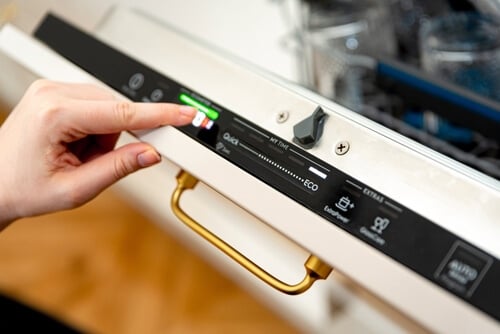If you move into a new student house or uni halls, you’re responsible for paying for the gas and electricity. Sometimes it’s included in the rent but it might also be a standalone bill.
You might also be able to switch your energy depending on what deals are available, but you’ll need to keep an eye on the market.
You can also use this guide to find out who your energy supplier is and how to save on energy.

Energy jargon buster
| Term | Meaning |
|---|---|
| Dual fuel | A plan that combines your electricity and gas supply. |
| Economy 7 | An energy plan that charges 2 different rates for your usage - a more expensive one for day use, a cheaper one for night use. |
|
Energy network operator
|
The energy network operator distributes gas or electricity to your energy supplier. Examples include National Grid, Scottish and Southern Electricity Network and SP Energy Networks.
|
| Energy price cap | This is the maximum that a supplier can charge per unit of energy. |
|
Energy supplier
|
Your energy supplier sends you the bill for your energy. Some examples of energy suppliers are OVO, EDF or British Gas.
|
|
Fixed rate
|
Your unit price for energy doesn't change for the duration of your plan.
|
|
kW (kilowatt)
|
A unit of electricity that’s used to power your household appliances. It’s exactly 1,000 watts.
|
|
kWh (kilowatt hour)
|
A measurement of the amount of energy an appliance uses over time.
|
|
Prepayment meter
|
Rather than pay a monthly or quarterly bill, with a prepayment meter you buy your energy on a pay-as-you-go basis from local shops or the Post Office.
|
| Tariffs | The plan that details how energy providers charge you for your gas or electricity. |
|
Unit price
|
This is the price for a quantity of energy.
|
|
Variable rate
|
The amount you're charged per kW used changes depending on what the energy supplier charges the energy company. Variable rates can suddenly rise if the cost of energy increases.
|
Do students pay energy bills?
Yes, anyone who lives in a property has to pay energy bills. You’re responsible for paying for the gas and electricity in your property as soon as you move in.
If you’re a student, you might manage your energy yourself and pay energy bills in addition to your rent. Alternatively, your energy needs may be handled by your landlord and therefore included in your overall rent.
Who supplies my gas and electricity?
If you're in halls, your gas and electricity should be included in your rent and you won’t need to know who supplies your energy. If you’re in a shared house, your landlord can tell you who supplies your energy. If your landlord doesn’t know, you can do the following.
How to find your gas supplier
Visit the Find My Supplier website and enter your postcode. Your provider should then appear.
Alternatively, call the Meter Number Helpline on 0870 608 1524. Calls cost 7p per minute plus your phone company's access charge. Be sure to get the Meter Point Reference Number (MPRN) for your property.
How to find your electricity supplier
Use the Energy Networks Association postcode search tool to find your energy network operator. Your energy network operator can tell you who your energy supplier is. Here are some of the energy network operators in the UK:
- Central and Southern Scotland: 0330 101 0444
- London, South East and Eastern England: 0800 029 4285
- Merseyside, Cheshire, North Shropshire and North Wales: 0330 101 0444
- North East England: 0845 070 7172
- Northern Ireland: 03457 643 643
- Northern Scotland: 0800 048 3516
- North West England: 0800 048 1820
- Southern England: 0800 048 3516
- South West England: 0845 601 2989
- South Wales, West & East Midlands: 0800 096 3080
- Yorkshire: 0800 011 3332
You should also contact Meter Point Administration Service (MPAS). They should confirm who’s registered to supply electricity to your home and give you a 21-digit Meter Point Administration number. You need this number when contacting your supplier about your energy bill.
How do I split energy bills in a student house?
There are a few ways you can do this:
Agree a split between you. One or 2 housemates agree to collect all the flatmates’ contributions. The housemates pay this into an account you've opened purely to pay the rent and the bills. The risk for this person is they might be chased by the energy company if someone doesn’t pay up on time.
Set up a joint account. Each person sets up direct debits to this account to cover the rent and energy bills.
Use bill-paying apps. Split The Bills is a good example of one of these. Companies like this set up all of the utilities for the household and take a regular payment from each housemate. They do charge for this though.
I've just moved into a new student home - can I switch energy providers?
There are fixed deals now returning to the market. See if any of them are suitable by comparing energy with Confused.com. All you need is your address and a recent bill to refer to. If you don’t have a recent bill, we may be able to find your details automatically.
Get personalised electricity deals straight to your inbox
How do I save money on energy as a student?
You might not be able to switch energy tariffs, but there are ways to reduce your energy usage. For example, you could:
-
Encourage everyone in the house to switch off devices when they're not being used
-
Coordinate your household cooking so the hob and the oven are being used at the same time
-
Use energy-efficient LED bulbs
-
Don't use washing machines and dishwashers until they’re full
You can find more energy saving tips in our guide.
Can students get help with energy bills?
There’s not much help for students with energy bills specifically. The energy price cap is designed to protect against high energy prices. Don’t fall into the trap of thinking that it’s a cap on your overall bill, though. If you use more than the price cap figure, you’ll pay more. If you use less, you’ll pay less. There are cheaper fixed deals available anyway, so if you're on a price-capped tariff then it's probably a good idea to look at switching.
Although there aren’t many grant options for students, if you’re struggling to pay your bills you can speak to an energy provider through Citizens Advice on 0808 223 1133.







